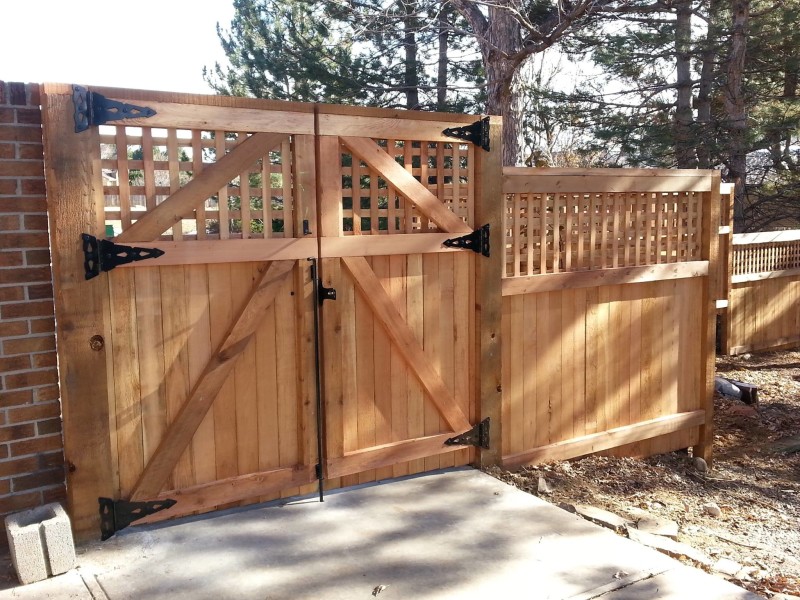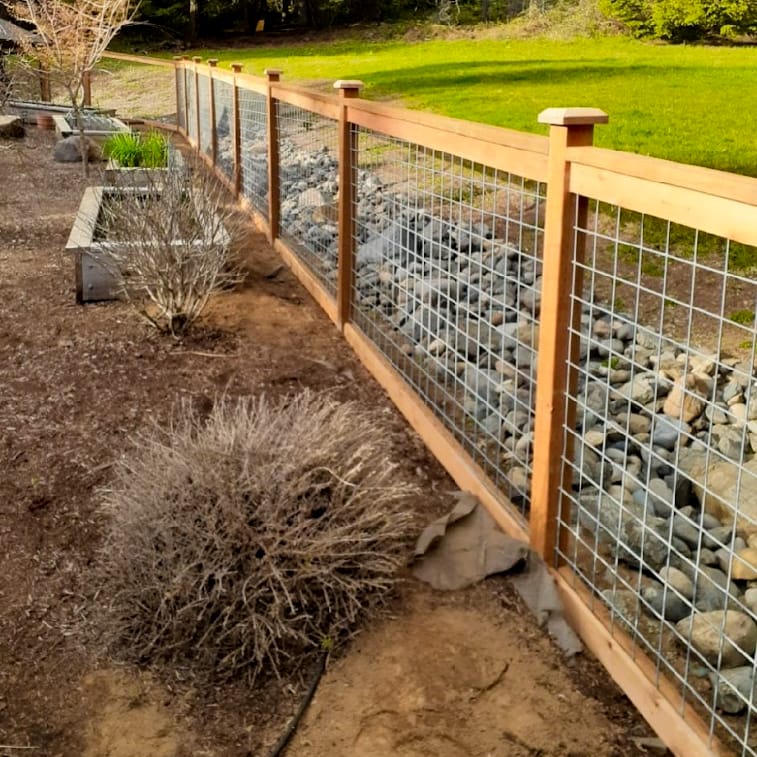Featured
When preparing to set up a fence, one of the initial considerations is expense. Secure fencing products can be found in a vast array of costs, with elements like resilience, upkeep, and layout affecting their total cost. This guide breaks down the average prices of popular fence products to help you select the most effective option for your budget plan and requirements.
Typical Price: $10--$ 30 per direct foot. Advantages: Cost-efficient, easy to set up, and needs marginal maintenance. Considerations: Less privacy and visual appeal compared to other materials. This sort of secure fencing is optimal for protecting huge locations like backyards or business buildings.
![]()
Ordinary Price: $15--$ 50 per direct foot. Benefits: Timeless visual appeals and flexible styles such as picket, lattice, or privacy fencings. Factors to consider: Calls for regular maintenance, consisting of staining or securing, to avoid rot and lengthen its life. Premium timber types like cedar or redwood expense even more but are a lot more immune to decay than economical choices like yearn.
Ordinary Price: $20--$ 60 per straight foot. Benefits: Resistant to weather, pests, and fading. Virtually maintenance-free. Factors to consider: Greater ahead of time expense contrasted to wood. Plastic is a superb lasting investment, specifically in regions with extreme climate condition.
Average Cost: $25--$ 70 per linear foot. Advantages: Ideal and rust-resistant for different residential property kinds, including slopes. Considerations: Much less strong than steel or wrought iron. This fence material is frequently made use of for ornamental objectives or to enclose pools and gardens.
Ordinary Cost: $30--$ 100 per linear foot. Advantages: Very long lasting and enhances building value with its ornamental layouts. Considerations: Calls for periodic maintenance to avoid corrosion. Wrought iron fences are optimal for upscale homes or those aiming to make a strong declaration.
Average Expense: $25--$ 55 per direct foot. Benefits: Reduced upkeep, environment-friendly, and immune to weathering. Considerations: Higher preliminary price than timber or chain link. This material simulates the look of timber while requiring less upkeep.
![]()
Typical Cost: $12--$ 30 per direct foot. Benefits: Renewable material and aesthetically one-of-a-kind. Factors to consider: Less durable than various other products and might need substitute faster. Bamboo is a terrific alternative for attractive purposes or temporary secure fencing needs.
Ordinary Cost: $50--$ 150 per linear foot. Advantages: Durable, offers superb privacy and noise insulation. Factors to consider: High installment cost and labor-intensive building. This choice is best matched for house owners looking to make a considerable long-term investment.
Added Costs to Remember. Installment: Labor costs commonly vary from $5--$ 20 per linear foot, relying on the material and design intricacy. Gates: Gates can add $200--$ 1,500 or more, based upon the product and dimension. Allows: Fence projects might call for permits, which can set you back $50--$ 400 depending on your place. Conclusion. Selecting the appropriate fence material relies on your budget plan, upkeep choices, and desired aesthetic. Chain link and bamboo are wonderful for budget-conscious home owners, while plastic and aluminum supply long-term worth with minimal upkeep. For those prioritizing elegance and resilience, wrought iron or masonry fences are outstanding options. By evaluating the expenses and benefits of each material, you can purchase a fencing that improves your property's worth and functionality.
- Chain Web Link Secure Fencing: Practical and budget-friendly. Chain web link fence is one of one of the most affordable choices for homeowners looking for practicality.
Typical Price: $10--$ 30 per direct foot. Advantages: Cost-efficient, easy to set up, and needs marginal maintenance. Considerations: Less privacy and visual appeal compared to other materials. This sort of secure fencing is optimal for protecting huge locations like backyards or business buildings.

- Wood Secure Fencing: Typical and Versatile. Wood fencing continues to be a preferred selection because of its natural beauty and customizable style choices.
Ordinary Price: $15--$ 50 per direct foot. Benefits: Timeless visual appeals and flexible styles such as picket, lattice, or privacy fencings. Factors to consider: Calls for regular maintenance, consisting of staining or securing, to avoid rot and lengthen its life. Premium timber types like cedar or redwood expense even more but are a lot more immune to decay than economical choices like yearn.
- Vinyl Fence: Low and resilient Maintenance. Plastic fence is a modern-day remedy for home owners looking for sturdiness without compromising aesthetic appeals.
Ordinary Price: $20--$ 60 per straight foot. Benefits: Resistant to weather, pests, and fading. Virtually maintenance-free. Factors to consider: Greater ahead of time expense contrasted to wood. Plastic is a superb lasting investment, specifically in regions with extreme climate condition.
- Light weight aluminum Fence: Fashionable and Long Lasting. Aluminum fences are known for their lightweight building and sleek layout.
Average Cost: $25--$ 70 per linear foot. Advantages: Ideal and rust-resistant for different residential property kinds, including slopes. Considerations: Much less strong than steel or wrought iron. This fence material is frequently made use of for ornamental objectives or to enclose pools and gardens.
- Wrought Iron Secure Fencing: Elegant and Solid. Wrought iron secure fencing integrates toughness with attractive allure, making it a premium choice.
Ordinary Cost: $30--$ 100 per linear foot. Advantages: Very long lasting and enhances building value with its ornamental layouts. Considerations: Calls for periodic maintenance to avoid corrosion. Wrought iron fences are optimal for upscale homes or those aiming to make a strong declaration.
- Compound Fencing: Eco-Friendly and Long-Lasting. Composite fencing is a blend of recycled wood and plastic, offering longevity and sustainability.
Average Expense: $25--$ 55 per direct foot. Benefits: Reduced upkeep, environment-friendly, and immune to weathering. Considerations: Higher preliminary price than timber or chain link. This material simulates the look of timber while requiring less upkeep.

- Bamboo Fencing: Natural and Affordable. Bamboo fence is an eco-conscious choice that adds a tropical visual to homes.
Typical Cost: $12--$ 30 per direct foot. Benefits: Renewable material and aesthetically one-of-a-kind. Factors to consider: Less durable than various other products and might need substitute faster. Bamboo is a terrific alternative for attractive purposes or temporary secure fencing needs.
- Rock and Stonework Fence: Costs and Timeless. Rock and masonry fences are one of the most resilient and visually striking alternatives, frequently considered a luxury addition.
Ordinary Cost: $50--$ 150 per linear foot. Advantages: Durable, offers superb privacy and noise insulation. Factors to consider: High installment cost and labor-intensive building. This choice is best matched for house owners looking to make a considerable long-term investment.
Added Costs to Remember. Installment: Labor costs commonly vary from $5--$ 20 per linear foot, relying on the material and design intricacy. Gates: Gates can add $200--$ 1,500 or more, based upon the product and dimension. Allows: Fence projects might call for permits, which can set you back $50--$ 400 depending on your place. Conclusion. Selecting the appropriate fence material relies on your budget plan, upkeep choices, and desired aesthetic. Chain link and bamboo are wonderful for budget-conscious home owners, while plastic and aluminum supply long-term worth with minimal upkeep. For those prioritizing elegance and resilience, wrought iron or masonry fences are outstanding options. By evaluating the expenses and benefits of each material, you can purchase a fencing that improves your property's worth and functionality.
Latest Posts
Unlock Your Dream Fence with Flexible Financing Options
Published Apr 12, 25
0 min read
Vision Center South - The Best Place for Hearing Care & Eye Exams
Published Apr 12, 25
2 min read
Experience Coastal Sophistication at Deauville Inn
Published Apr 12, 25
1 min read